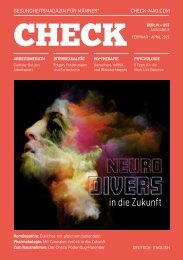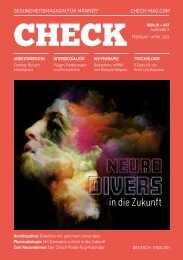CHECK Magazin - Gesundheitsmagazin für Männer No.11
Das Streben nach Leistung, Produktivität und Gewinnmaximierung steht im Fokus unserer modernen Arbeitswelt. Im heutigen Arbeitsalltag wird ein hohes Maß an Flexibilität, Kreativität, Anpassungsvermögen sowie ständige Verfügbarkeit und zugleich emotionale Belastbarkeit verlangt. Kognitiv und psychosozial werden wir stark herausgefordert. Es ist schwer, die Balance zwischen Über- und Unterforderung zu finden – beides ist gesundheitlich schädlich.
Das Streben nach Leistung, Produktivität und Gewinnmaximierung steht im Fokus unserer modernen Arbeitswelt. Im heutigen Arbeitsalltag wird ein hohes Maß an Flexibilität, Kreativität, Anpassungsvermögen sowie ständige Verfügbarkeit und zugleich emotionale Belastbarkeit verlangt. Kognitiv und psychosozial werden wir stark herausgefordert. Es ist schwer, die Balance zwischen Über- und Unterforderung zu finden – beides ist gesundheitlich schädlich.
Erfolgreiche ePaper selbst erstellen
Machen Sie aus Ihren PDF Publikationen ein blätterbares Flipbook mit unserer einzigartigen Google optimierten e-Paper Software.
Work Life<br />
WHAT TO DO WHEN EVERYTHING<br />
GETS TOO MUCH AT WORK?<br />
In order to bring about change at a structural,<br />
institutional and/or social level, one can<br />
get involved politically, join a union or initiate<br />
corporate change and management processes.<br />
While these are commendable approaches, they<br />
can also be tedious that cost additional time and<br />
energy. But what do we do if we cannot transform<br />
the entire world of work, but still wish for an<br />
improvement? What can we do for ourselves on<br />
a personal level to “detoxify” our working life?<br />
A STRONG TEAM<br />
Already when looking for a job, one should<br />
pay attention to signs of whether the working<br />
environment is healthy or possibly toxic. We<br />
should not only show that we are well qualified<br />
for the company, but also check whether the<br />
company is a good fit for us and whether our<br />
first impressions of our colleagues, bosses and<br />
working atmosphere are right. Because if you get<br />
along with your colleagues and superiors, you can<br />
overlook the little things and get through tough<br />
times together. Therefore, the whole team should<br />
be involved in the selection of a new employee,<br />
and a close look should be taken to see whether<br />
they fit into the team.<br />
A strong team overcomes hurdles together<br />
and is a decisive motivating factor. If we build<br />
up a stable network through which we receive<br />
professional and social support and in which we<br />
can share joy and success, this contributes significantly<br />
to our well-being at work and our health.<br />
MAKE IT PRETTY!<br />
The interior design also influences the working<br />
atmosphere and our motivation to come to<br />
work. Do we like the working area, is it bright<br />
and inviting, are there e.g. plants, fruit bowls and<br />
relaxation options? Of course, not all of us can<br />
work in a hip “feel good office”. Small changes<br />
are often enough to make you feel better. After<br />
the workplace has been newly set up, there will<br />
definitely be colleagues with whom you can start<br />
an office beautification project.<br />
HAVE COURAGE AND TALK ABOUT<br />
WHAT BOTHERS YOU!<br />
We can work towards a positive climate by communicating<br />
openly and treating our colleagues<br />
with respect. Many want transparency and<br />
open communication, but this also requires the<br />
courage to address unpleasant issues. Instead<br />
of letting off steam with colleagues, it is worth<br />
trying to talk to the person concerned and thus<br />
get rid of problems straight away – without eating<br />
them up.<br />
People are often unaware of<br />
the impact their behaviour or<br />
decisions have on others. It<br />
is important to be specific<br />
and make positive suggestions.<br />
The basics of constructive criticism include: staying<br />
calm, respectfully describing our experiences<br />
from the first-person perspective, listening<br />
actively and being aware that possible defensive<br />
reactions are natural. At the same time, we have<br />
to be open to feedback from others and allow<br />
different views to exist. In this way, we promote<br />
a positive feedback culture and actively contribute<br />
to change. If there is a fundamental lack of<br />
an open, appreciative communication culture in<br />
the company, addressing it openly can promote<br />
change and prompt management, for example,<br />
to establish communication training or teambuilding<br />
measures. How we lead by example has<br />
a major impact on the working atmosphere and<br />
how others treat us. If we feel overwhelmed or<br />
underwhelmed and address this openly, solutions<br />
can be found together.<br />
It can be particularly difficult for people who have<br />
experienced discrimination to stand up for themselves.<br />
But especially for them it is important to<br />
strengthen their self-confidence again, to address<br />
needs and not to be intimidated, but to take the<br />
space they are entitled to.<br />
SET REALISTIC GOALS AND<br />
SCHEDULE BREAKS<br />
Achieving goals makes you happy. However, we<br />
are not performance machines. Therefore, it is<br />
important to set manageable and achievable<br />
goals and to celebrate even small successes.<br />
Breaks are important so we don’t burn out. These<br />
should be used to switch off and scheduled as ▶<br />
<strong>CHECK</strong> BERLIN #11 17

















